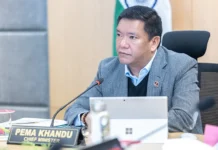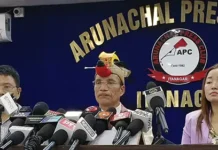PASIGHAT, 13 Nov: The department of Tribal Studies, Arunachal Pradesh University (APU) here on Wednesday organized a session of special talks addressing pivotal issues in the fields of tribal studies. The event featured two esteemed scholars: prof. Sarit Kumar Chaudhuri from the department of anthropology & Dean, faculty of social sciences, Rajiv Gandhi University, who delivered a talk on “Future of Tribal Studies: Evolving Issues and Concerns,” and prof. Debarshi Prasad Nath from the department of cultural studies, Tezpur University, Assam, who spoke on the topic of “Cultural Rights and Our Societies.”
Prof. Sarit Kumar Chaudhuri offered insights into the future of tribal studies, highlighting the need for adaptive research methodologies that address the intersection of identity, policy and socio-environmental changes impacting tribal communities. He encouraged an interdisciplinary approach, stating, “Our research must remain flexible and responsive to the dynamic socio-political changes
that affect indigenous populations.” The future of tribal studies lies in our commitment to advocacy, sustainable development and cultural preservation, he added. Prof. Chaudhuri concluded his talk by encouraging students to adopt a proactive approach to their studies, emphasizing that the future of tribal studies will be shaped by the integration of both traditional and contemporary knowledge.
Prof. Debarshi Prasad Nath centered his talk on the importance of cultural rights in preserving community identity and heritage especially, for tribal and indigenous groups. He discussed the ethical and legal imperatives to protect cultural rights amidst globalization, noting, “Cultural rights are the backbone of a community’s heritage and self-expression. It is essential that we recognize these rights to promote inclusive societies that value diversity.” Prof. Nath’s talk concluded with a message of empowerment for the students, faculty, and researchers present, urging them to actively participate in the protection and promotion of cultural rights through their academic and professional endeavours.
The talks were followed by an interactive session, during which students, faculty and participants engaged with the resource persons, posing questions on the complexities of balancing modernization with cultural preservation, as well as the roles of academic institutions in supporting tribal rights and heritage.
Head of the department of Tribal Studies Dr. Eli Doye and event coordinator Dr. Tarh Ramya also spoke on the occasion.


